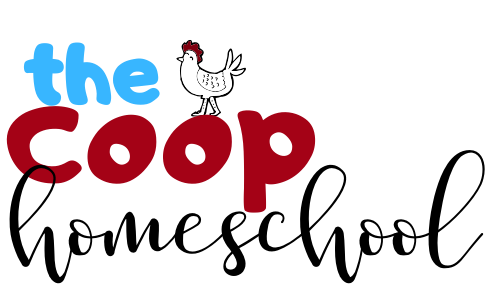Episode 80: Homeschool Success
How do you know if you are succeeding at homeschooling? We dive into a couple ways to measure your success, share some of our successes, and provide helpful takeaways. In our Coop Q & A, we answer the question, "What is one thing my child should learn before adulthood?"
Watch
Listen
Show Notes
*some of our recommendations may include affiliate links, which means when you order them from Amazon, we will receive a small commission.
Scoop on the Coop
Jessica shares about the benefits of a curriculum exchange and how to find one in your area.
Mandi reminds us, “Do not underestimate the power of a playdate.” Sometimes a playdate can be more educational than any books or “educational work” you assigned that day.
Topic: Homeschool Success
We are rounding the bend to the end of the school year, and so we thought it’d be a great time to take a look at a homeschool success. We love to share our homeschool fails to show that we are all in the same boat, and we are all learning in this homeschooling adventure.
1) Measuring Success
A. Measure Using Your Mission Statement
Mandi measures her homeschool success using her homeschooling mission (what she wants out of homeschooling). The great thing about using your mission to measure your success is that it is unique to you! Check out our Homeschool Starter Pack for our walk-through activity for writing your own mission statement.
1) Your Mission is Your Guiding Light:
If you have written out a general mission about why you homeschool and what you want in homeschooling, then, if you do any of that - you will feel successful for those moments.
2) Your Mission Helps You Avoid Comparison:
Your mission is your own so it helps redirect your mindset when you feel like others do it so much “better.” You might like what someone else does - but it doesn’t mean that is something you should be doing for your mission and your child.
“RULE 4: COMPARE YOURSELF TO WHO YOU WERE YESTERDAY, NOT TO WHO SOMEONE ELSE IS TODAY” ― Jordan B. Peterson, 12 Rules for Life: An Antidote to Chaos
This quote reminds us that success is about you and in this case, possibly, your child too - it’s not about another homeschool mom, child, or family.
3) Mission Reminds You That It’s Not About a Checklist
Using your mission statement as your measuring stick, helps you avoid feeling like you didn’t succeed because you didn’t get very far in curriculum or in a book.
If your child did not learn a specific skill you planned, but your mission statement was met pretty regularly, that specific skill won’t matter when it comes to measuring success.
B. Measure with Evaluating Progress
Jessica looks at progress as a way to measure success. Is there evidence of progress compared to last year? Last month? Has there been forward movement in knowledge, in books, in understanding? Was a math book completed? Has a new skill developed?
It’s important to note that measuring progress is only using comparison within the child’s own educational trajectory, not against any one else.
C. Measure by Observing Applied Learning
Sometimes all you have to do is observe your child’s interaction with her own knowledge.
Ask yourself: Is there tangible evidence that your student understood something you studied together and cannot only recall information but apply it accurately in context?
2) Examples of Success
Using Mission to Measure: Mandi shared her biggest example of success from this year. Using this verse as their homeschool theme, “I praise you, for I am fearfully and wonderfully made.” - Psalm 139:14, Mandi embarked on a deep dive into a unit study about the human body. In doing this they engaged in fun and challenging experiential learning, shared a bonding family museum trip out of state, and read aloud interesting stories loaded with opportunities for character development and wisdom discussions. This study truly followed her homeschooling mission in numerous ways, which fulfilled her and enriched her family’s life.
Using Progress to Measure: Jessica saw huge progress this year with the bigger goals she set for this year. She tackled a number of formal unit studies, which challenged her and her children to learn and grow in new ways. And they did! Throughout the year they enjoyed unit studies about space, national parks, oceans, and California. With field trip experiences to boot, the progress was evident and rewarding.
3) Takeaways
The way you measure success is personal and unique to you.
Your homeschooling mission statement should accurately reflect why you homeschool and what you want out of homeschooling.
Do not compare your homeschool life or your child to others. If you struggle with comparison, redirect yourself toward your mission. If needed, take a break from social media to avoid comparison with others.
Write down a joyful or successful moment each day, week, or month. What made you feel like it was a success? This list can be a great reference for you later when you need encouragement, inspiration, or even to reframe your mission statement.
Ask your child to share her favorite moments and experiences, and write those down. Those moments are successes too!
Celebrate success, and treat yourself! So…check out our new store! Our merch is regularly updated with new styles of shirts, pajamas, library tote bags, and more.
Coop Q & A
Question: What is one thing you need your kids to know before adulthood?
Answer: Our top two things are Logic and Rhetoric and a firm understanding and commitment to their Christian faith.
The Coop Homeschool is a participant in the Amazon Services LLC Associates Program, an affiliate advertising program designed to provide a means for sites to earn advertising fees by advertising and linking to Amazon.com. See Disclosure Page for more information.

